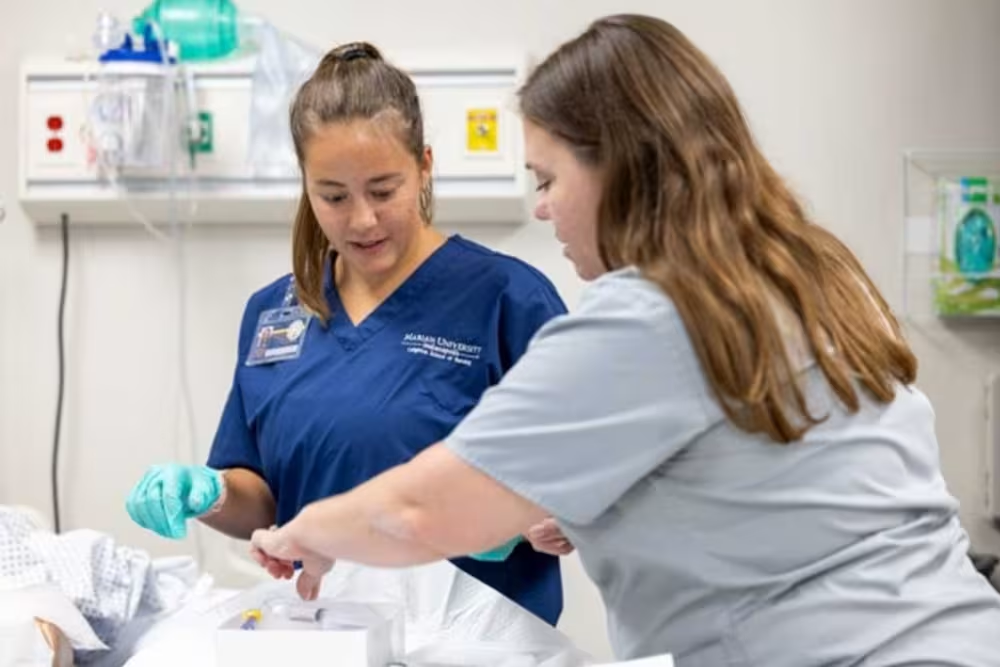How Does Travel Nursing Work and Is It Right for You?
Each blog post is dated and contains accurate information as of that date. Certain information may have changed since the blog post publication date. If you would like to confirm the current accuracy of blog information, please visit our ABSN overview page or contact admissions at 866.892.6463.
What is a travel nurse? How does travel nursing work? A travel nurse is a registered nurse who accepts short-term positions at healthcare facilities across the country. These temporary positions give travel RNs the opportunity to explore new places while earning a living.

Ready to turn your career into an adventure? Travel nursing makes it possible. A travel registered nurse (RN) accepts temporary nursing jobs at healthcare facilities around the country. When one job is completed, the RN can take time off if they wish or jump right into the next job somewhere else or in the same area. Since nurses are in demand across the country, there are plenty of options to choose from.
At Marian University, you can accelerate your pathway toward an exciting career as a travel nurse. Our Accelerated Bachelor of Science in Nursing (ABSN) program is designed for individuals with a non-nursing bachelor’s degree or previous college credits who are interested in switching to an RN career by earning a BSN in as few as 16 months.

Discover how students without a prior bachelor’s degree can enroll through our Associate of Science in Health Sciences transfer pathway.
What Is a Travel Nurse?
A travel RN accepts short-term assignments at healthcare facilities in various places. Travel nurses are connected to these opportunities via travel nursing agencies. Once you choose a travel nursing agency to work for, you’ll select assignments from a database and apply to them. Hospitals submit these job openings to travel nursing agencies when they need to address short-term staffing gaps. A travel nursing assignment may last just a couple of months or up to about half a year.
Travel nursing allows you to immerse yourself in new regions. You can explore the areas you move to more thoroughly than if you vacationed there. All this while earning a competitive salary. Travel nursing is ideal for RNs with an adventurous spirit.
There are travel nursing positions available to all types of nurses across all healthcare specialties, from oncology RNs to nurse anesthetists to critical care nurses and beyond. No extra skills are required to be a travel nurse; you must meet the same educational requirements as if you took a long-term nursing job in your hometown.
In addition to a nursing degree, you’ll need an RN license. Nurses must be licensed in each state that they want to work in. To avoid the need to hold a handful of different licenses, travel RNs can obtain a multistate license, provided their primary residence is in a Nursing Licensure Compact (NLC) state. That multistate license allows a travel RN to work in any other jurisdiction that is a member of the NLC. As of 2025, 43 jurisdictions are NLC members, including Indiana and Tennessee.

What Do Travel Nurses Do From Day to Day?
Once you’ve settled into your travel nursing job, you’ll perform the range of duties typical for a nurse in your practice area. Travel RNs may have experience in a wide range of nursing specialties and work in a range of settings, from emergency rooms to oncology treatment centers. While many nursing tasks are specific to a practice area, common tasks that travel RNs may do include:
- Administering medications
- Handling wound care
- Performing patient assessments
- Preparing patients for discharge
- Providing patient and family caregiver education
- Setting up IV lines and other medical equipment
- Updating health records
How to Become a Travel Nurse
Travel nursing can be an ideal career path for RNs who love to see new places, meet new people and try new things. Plus, travel nursing is highly flexible; when a contract expires, you’ll have the option of pursuing a permanent placement if you wish, perhaps even at the hospital where you were last placed. The process of how to become a travel nurse starts with earning a BSN.
Step 1: Earn Your BSN
Like other RNs, aspiring travel nurses are best served by earning a bachelor’s degree in nursing. You can become a nurse with an associate’s degree or even a diploma, but these degrees will place you at a competitive disadvantage in the job market compared to BSN-educated nurses. If you previously completed a non-nursing Bachelor of Arts (BA) or Bachelor of Science (BS), you may qualify to apply to Marian University’s ABSN program. With our ABSN program, you could earn your BSN in as few as 16 months.
Like traditional BSN programs, an ABSN program combines classroom instruction with experiential learning in skills and simulation labs, as well as clinical rotations. In other words, you’ll study nursing theory coursework while learning hands-on nursing skills, both in controlled learning environments and in area hospitals.
Wondering what to expect during clinical rotations in nursing school? Learn what you’ll do and how to excel.

Step 2: Earn Your RN License
After graduating with your BSN, the next step is to acquire state licensure. All aspiring RNs must pass the NCLEX-RN, the national exam designed to evaluate nursing knowledge and clinical skills. The NCLEX-RN is a rigorous exam, so it’s important to set aside plenty of time to prepare for it. If you don’t pass it on your first attempt, you can retake it.
Step 3: Gain Nursing Experience
It’s customary for travel nursing agencies to require applicants to have at least a year or two of clinical experience before becoming travel RNs. During this time, you’ll be able to sharpen your nursing skills and deepen your healthcare knowledge. Plus, you might encounter some travel nurses in your own hospital. If so, don’t be shy about picking their brains. Ask them which agencies they work for and if they would recommend those agencies to aspiring travel nurses.
Step 4: Apply to a Travel Nurse Agency
Every travel RN agency establishes its own hiring criteria and processes. Once you’ve chosen the agency that seems right for you, you’ll need to follow their application directions. In general, however, you will need to fill out an application and submit it along with your academic documentation, professional licenses, certifications and medical clearances.
Then, you’ll have a chat with the agency’s recruiter, either in person or via a videoconferencing platform, during which you’ll talk about the next steps. Be sure to ask plenty of questions during your session with the recruiter, such as which reimbursements are available, what their benefits packages are like, and from which states and facilities the agency sources nursing jobs.

Step 5: Apply to Your First Travel Nursing Job
Once you’ve been accepted to one or more agencies, you can apply to your first travel RN job with the help of your recruiter. Use the filters on the job board to narrow down your search, such as searching by nursing specialty and state. You may also be able to search by contract length. When you find a position that appeals to you, read all the details carefully and then submit your application. Expect to have a remote interview.
If you land the job, you can start arranging logistics, such as whether you’ll stay in agency-provided housing or whether you’ll secure your own temporary housing. You should also consider your travel arrangements and spend some time learning about your destination, such as what you can expect from the weather and what the public transportation options are.
Is Travel Nursing Right for You?
If you enjoy meeting new people and adjusting to new situations, and if the idea of frequent travel appeals to you, then becoming a travel RN could be the right choice for you. In addition, consider the following benefits of becoming a travel nurse:
- Ability to take extended time off between contracts
- Extra perks like housing stipends
- Highly competitive pay
- Lots of professional networking potential
- Minimal exposure to office politics
- Opportunities to sharpen your skills by learning from a wide range of people
On the other hand, it’s also important to consider potential downsides like homesickness, less career stability and the need to move frequently. Ultimately, it’s a matter of personal preference. Keep in mind you can always try travel nursing for a while to see if it suits you and then look for a permanent position if desired.

Earn Your BSN Faster at Marian University
If a career in travel nursing appeals to you, you can get started working toward your dream career faster with our ABSN program. At Marian University, you can graduate in as few as 16 months with the support of attentive nursing instructors and Academic Success Coaches. Our nonprofit, faith-based school infuses our curriculum with our Franciscan values.
Contact us today and speak with an admission advisor about taking the next step in your career path.
